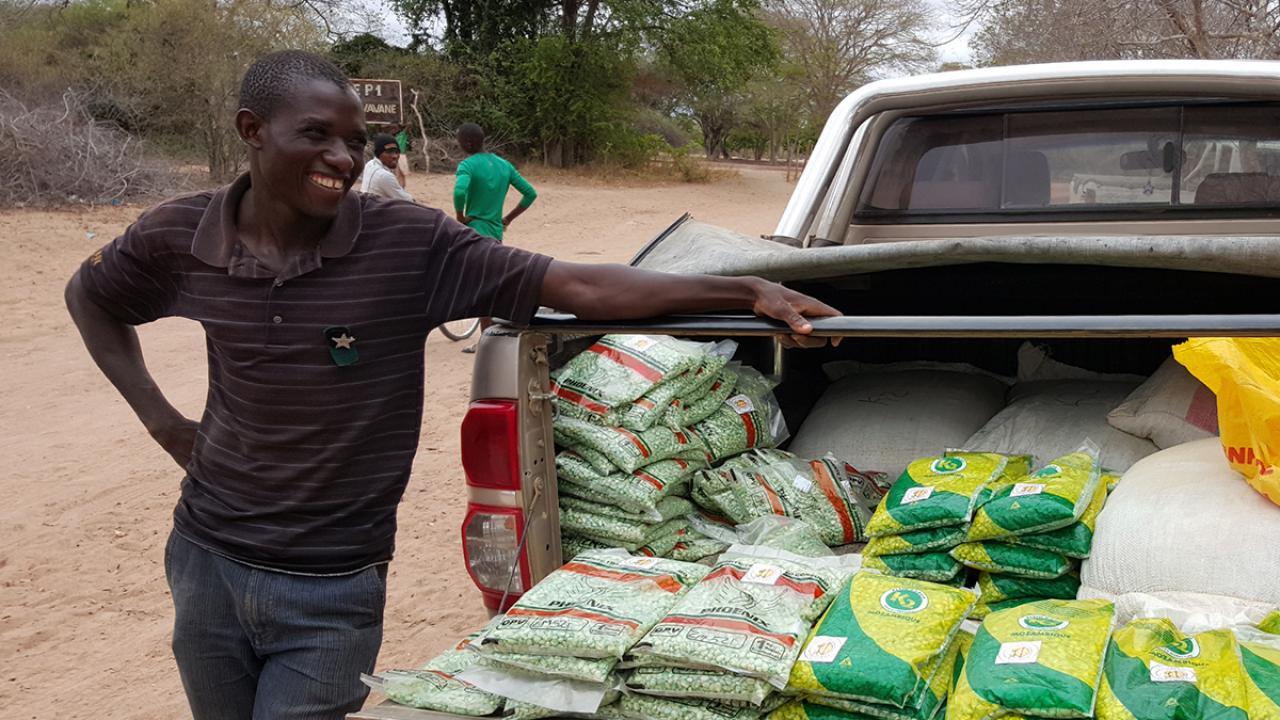
Leveraging the Seed System to Solve the Last Mile Challenge for Insurance
During the planting season, Mozambique’s small agrodealers drive for hours to reach distant rural communities. The improved seeds and other inputs they bring for sale give farmers a chance to prosper. A handful of these agrodealers have now added a product that can reduce smallholder farmers’ risk from drought: insurance.
Feed the Future Innovation Lab for Markets, Risk & Resilience research in Mozambique is leveraging the strengths of small agrodealers to scale an innovative bundle of stress-tolerant maize and insurance. This research could ensure that the market itself will sustain the bundled product — and its benefits to farmers — long after the study has ended.
“Input dealers are extremely aware of the weather risk facing smallholder farmers,” said Jonathan Malacarne, the project’s lead principal investigator and an economist at the University of Maine. “If the insured seed bundle we designed makes farmers better off, then they will have the resources to purchase inputs in the years to come.”
Bundling Stress-Tolerant Maize and Insurance
The stress-tolerant maize and insurance bundle in this study was first developed at UC Davis and tested in Mozambique and Tanzania from 2015 to 2018 with support from USAID. The bundle paired maize varieties developed by the International Maize and Wheat Improvement Center (CIMMYT) as part of the Drought Tolerant Maize for Africa (DTMA) project with index insurance providing a seed-replacement guarantee.
The bundle generated both increased yields and significant benefits after severe drought. Across smallholder farmers who took part in the study, the seeds offered a 12 percent yield advantage in normal years and maintained their yields in a moderate drought. In the year after severe drought losses, farmers in communities with access to the bundled product nearly doubled their investments in maize production, generating even higher yields than they had in the year before the shock.
After the UC Davis study ended, NCBA CLUSA adopted their own maize and insurance bundle and partnered with networks of small agrodealers to make it available. However, that effort, also funded by USAID, has since ended, and with it access to the bundle itself.
Adding Insurance to Seed Sales
The approach for this new research in Mozambique is a novel one: make the agrodealers themselves insurance agents. That way, insurance sales can start immediately with a transaction that’s as simple as buying seeds.
While the idea met with enthusiasm from agrodealers, none had experience marketing insurance.
“Agrodealers usually work with farmers, so we thought that it’s easier for them to provide information on insurance,” said Lourenco Manuel, a co-principal investigator on the project and director of the Research Center for Agricultural Policy and Programs (CEPPAG) at Eduardo Mondlane University, Mozambique, where he is an assistant professor of agricultural economics.
Manuel has worked closely with the agrodealers who would join the project. This included identifying agrodealers across Manica Province based on recommendations from local organizations and nongovernmental organizations, including NCBA CLUSA. He and his team also led in-depth interviews with agrodealers to ensure they would be a fit. The project’s insurance company partner, Hollard Insurance, then provided training so the eight agrodealers who joined the project could become insurance agents.
Small agrodealers like these face challenges of their own, but without them many remote rural communities would have no access to inputs like improved seed at all. During the planting season, they hire extra help and send employees out in trucks for community field days. Insurance sales provide a new source of revenue.
“The agrodealers we are working with are aware of the logistical challenges of reaching these rural communities,” said Malacarne. “They want to solve those challenges and tap into large networks of smallholder farmers.”
Overcoming the Last Mile Challenge for Insurance
Right now, the first sales of the seed and insurance bundle have just begun. The insurance is different than the UC Davis study four years ago in that insurance payouts, based on the cost of the seed and the severity of the drought, are paid in cash.
The research is primarily testing different ways to spark lasting adoption of the seed and insurance bundle. They include a temporary subsidy to reduce the cost. They also include community trainings and even a tablet-based game to simulate the outcomes of the insured seed over multiple seasons.
While the main purpose of the study focuses on sparking adoption, Malacarne said he also hopes to see this network of agrodealers thrive by selling a financial product like insurance for the first time. That success would prove that with the right partners it’s possible to for this approach to work in any setting that is similar to rural Mozambique.
“On the implementation front, that’s the innovation,” said Malacarne. “We talk about last mile problems in input delivery, and this approach addresses the last mile problems for financial products like insurance.”
This article was originally published on USAID's Agrilinks.
